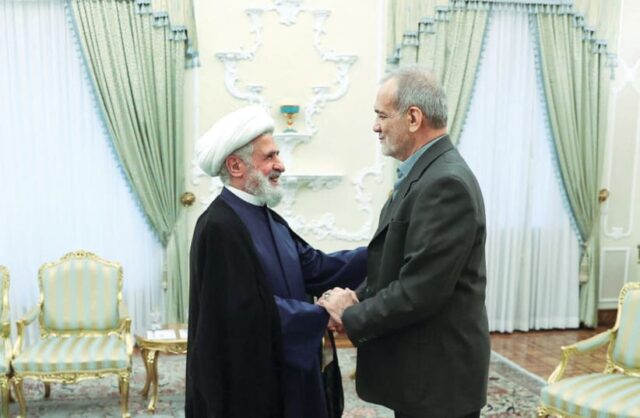
Governments in many capitals of the world have repeatedly expressed apprehensions about escalation of the Gaza conflict and Hezbollah’s war of attrition against Israel. They fear greater violence, more casualties and an expansion in the number of regional participants in the war. United States President Joe Biden sent aircraft carriers to the region signaling his desire to prevent escalation and repeated on several occasions his famous warning, “Don’t” – with limited success.
Such fears, warnings and the many calls for restraint are understandable, particularly for Western audiences, but they are not very useful. First, these pronouncements express genuine reluctance to use force and are seen by most people in the Middle East as weakness – a trait despised in these parts. In contrast to Western attitudes that view the use of force as uncivilized and anachronistic, Middle Easterners see it as a legitimate option in the toolbox of international actors.
Moreover, it is popular. Hamas gained huge popularity among Palestinians for its October 7 attack on Israel. Israelis cherish successful targeted killings, and these are also well appreciated by its Arab allies.
In many situations, climbing the escalation ladder is probably the best way to put an end to violence. Indeed, the Hamas raids and atrocities are a direct result of the containment policy conducted for years by Israel. Instead of escalating and exacting a high price from Hamas to change its strategic calculus, Israel preferred to absorb many rocket attacks and refrained from a strong riposte that could lead to escalation. This only gave time to Hamas to build its military capabilities and acquire the might to withstand an Israeli offensive now in its tenth month.
De-escaalation a Western Concept
Similarly, Israel’s reluctance to preempt in Lebanon allowed Hezbollah to build a formidable missile arsenal. This organization grew to become a monster that since October 8 has conducted, undeterred, a war of attrition against Israel. With Iran’s blessing, it succeeded in emptying the north of Israel of its residents and in forcing the IDF to deploy large military formations south of the Lebanese border that are needed to attain a faster victory in Gaza.
Attrition warfare is the best outcome for the population-centric Iranian strategy and the worst possible scenario for Israel. The continuous existence of over one hundred thousand missiles in the hands of Hezbollah leader Hassan Nasrallah, after he crossed the Rubicon of waging a long war of attrition, is an intolerable situation for Israel. Only escalation intended to eliminate the missile arsenal can put an end to the war of attrition.
In the Lebanese case, the “diplomatic solution” the Americans and the French are pushing for is a mirage. Hezbollah cannot be trusted to abide for long to any agreement that does not serve its ends, and the UN contingent in south Lebanon assigned to prevent the Hezbollah encroachment toward the Israeli border has proved its impotence.
War against Hezbollah is inevitable; Israel might have to wait for more hospitable circumstances, but they will come.
Readiness to escalate and bear additional costs signals determination to attain necessary goals. Victory in war is achieved not only by the greater ability to exact costs from the enemy, but no less by the capability to sustain pain and suffering.
Actions Deter Louder than Words
Therefore, being perceived as having a predilection for escalation helps deterrence. Fear of retaliation has a cooling effect on many tempers all over the world. This is the rationale for the threatening behavior of the bully in a tough neighborhood. Unfortunately, the Middle East is such a neighborhood. Deterrence must be maintained over time by the occasional use of force. This is its only lubricant – not words.
Risk aversion is often lauded in many circles and international situations. Yet, restraint in the strategic arena is problematic. It could be construed as a fatal weakness, and it might invite aggression. This is the way the bullies read things, particularly the Middle East variety.
Each situation obviously requires a separate calculation of opportunities and risks. But the Pavlovian advice to act with restraint, and warnings of escalation, indicate a lack of understanding of the strategic game played by the violent Mideastern actors. Words such as goodwill, trust, and search for stability have a different meaning in the vocabulary employed by the radicals in the region. Iran and its proxies want to destabilize it. They all want the United States out of the Middle East and that the regimes of America’s allies fall and be substituted by radical Islamists.
They cannot be persuaded to refrain from scheming against the West and its regional allies. Diplomacy has little value. Westerners who worship the sanctity of life are not fully aware that Islamist radicals are ready to make many sacrifices and to bear a great deal of pain. Iran has been under economic sanctions of various intensity for decades with little impact on its policies.
In the final analysis, the only effective persuasion is the use of force. This requires willingness to escalate the struggle for freedom and other Western values. Islamist radicals need to be defeated. The timing of escalation can be debated but not the course of action.
The writer is president of the Jerusalem Institute for Strategy and Security and chair of the Department of Strategy, Diplomacy, and National Security at Shalem College.

